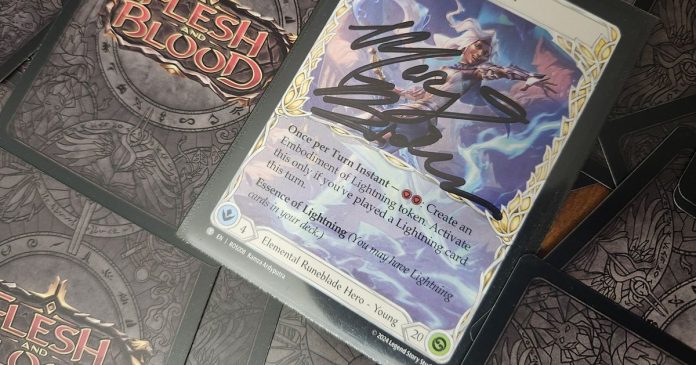Earlier this month, I competed in the national championship of a trading card game. Despite learning how to play the game less than a year ago, I got 99th place out of the more than 500 players who qualified for the contest.
In “Flesh and Blood,” two players trade blows until their hero is worn down and defeated. The game’s name and description sound very harsh and masculine. I much prefer the game’s acronym FAB. It sounds more like a dance. Two people fitting together their four-card hands each turn to make the most beautiful scene they can.
The game is akin to a card game version of fighting video games like “Super Smash Bros.” or “Street Fighter.” Or, so I am told. I actually don’t really play video games.
And that’s a big reason I got into card games. As a kid, friends would play video games but my disability – a very mild form of cerebral palsy – prevented me from playing game consoles with both hands. Card games like “YuGiOh” and “Magic: The Gathering” were ways of getting that similar experience with my friends in a way my disability did not slow me down.
I played card games off and on through college but stopped as I entered adulthood. I played with a core group of friends in Chicago but stopped as I moved to rural area. As I started my career, I faced the fact that the fan base for many of these games are overwhelmingly male and often not welcoming to anyone who can’t be classified as one of the bros.
I also feared how I could be perceived as an adult playing games many imagine are meant for children. I was trying to be a serious journalist who covered events of importance. I didn’t have time for childish hobbies.
After coming across “Flesh in Flood” after not playing card games in years, I couldn’t get the game out of my head. Weeks later, I went to Sage’s Portal – a local Spokane board game cafe – and asked the owner to teach me how to play.
I fell in love with the game immediately. It was so much better than any card game I’ve played. Every decision you make in an hourlong game matters. When you lose, it is because of the decisions you made. Very rarely is a game decided on random chance.
Since last September, I’ve played or thought about FAB nearly every day. I’ve become deeply ingrained in the game’s small Spokane community, made friendships and even traveled to several large events.
Unlike other card games I’ve played, the community of “Flesh and Blood” has been universally welcoming. While its fanbase is still predominately male, there is a dedicated group of non-men in the game both locally and globally. And some of the best and most celebrated players in the game are women.
Some friends invited me to a large tournament in Portland last year. Having just picked up the game a few months before, I didn’t think I could compete on that level and the prospect of being alone in a convention hall with hundreds of men was intimidating.
But as the game’s World Championship played out in Japan, I saw Mercy Bickell get second place in the 2024 “Flesh and Blood” World Championship. A week later in Portland, I got to play against Mercy and actually defeat her – giving me confidence to play the game at a competitive level.
As I delved deeper and deeper, I felt the shame creep back in. I’ve often been embarrassed to tell people I was playing a card game called “Flesh and Blood.” It was too aggressive. It was too childish. My world as a geeky gamer girl was far apart from my life as a serious journalist.
I did well enough in some local-ish events that I qualified for the United States FAB National Championship, which took place in Las Vegas this June. I didn’t expect to do well, but I decided to go. While nowhere near the top of the standings, I did much better than I thought I would.
Through 15 hourlong rounds over two days, I won more games than I lost … barely. Most players in the tournament did not do well enough to compete on the second day.
I kept my own with the best players in the United States. I was in the top 100 players in the United States. At least at this one weekend and one event with 515 players.
Driving back to Spokane after the event, I felt something I hadn’t ever felt with card games: pride.
FAB isn’t something to be embarrassed or ashamed about. I am good at something. Maybe really good. And I’m proud about that.
